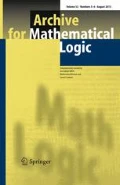Abstract
Default logic is one of the most popular and successful formalisms for non-monotonic reasoning. In 2002, Bonatti and Olivetti introduced several sequent calculi for credulous and skeptical reasoning in propositional default logic. In this paper we examine these calculi from a proof-complexity perspective. In particular, we show that the calculus for credulous reasoning obeys almost the same bounds on the proof size as Gentzen’s system LK. Hence proving lower bounds for credulous reasoning will be as hard as proving lower bounds for LK. On the other hand, we show an exponential lower bound to the proof size in Bonatti and Olivetti’s enhanced calculus for skeptical default reasoning.
Similar content being viewed by others
References
Amati G., Aiello L.C., Gabbay D.M., Pirri F.: A proof theoretical approach to default reasoning I: tableaux for default logic. J. Log. Comput. 6(2), 205–231 (1996)
Antoniou G.: A tutorial on default logics. ACM Comput. Surv. 31(4), 337–359 (1999)
Beyersdorff, O., Meier, A., Müller, S., Thomas, M., Vollmer, H.: Proof complexity of propositional default logic. In: Proceedings of 13th International Conference on Theory and Applications of Satisfiability Testing, vol. 6175 of Lecture Notes in Computer Science, pp. 30–43. Springer, Berlin, Heidelberg (2010)
Bonatti, P.A.: A Gentzen system for non-theorems. Technical Report CD/TR 93/52, Christian Doppler Labor für Expertensysteme (1993)
Bonatti P.A., Olivetti N.: Sequent calculi for propositional nonmonotonic logics. ACM Trans. Comput. Log. 3(2), 226–278 (2002)
Bonet M.L., Buss S.R., Pitassi T.: Are there hard examples for Frege systems?. In: Clote, P., Remmel, J. (eds) Feasible Mathematics II, pp. 30–56. Birkhäuser, Basel (Boston/Stuttgart) (1995)
Bonet M.L., Pitassi T., Raz R.: On interpolation and automatization for Frege systems. SIAM J. Comput. 29(6), 1939–1967 (2000)
Cadoli M., Schaerf M.: A survey of complexity results for nonmonotonic logics. J. Log. Program. 17(2/3&4), 127–160 (1993)
Cook S.A., Reckhow R.A.: The relative efficiency of propositional proof systems. J. Symb. Log. 44(1), 36–50 (1979)
Dix, J., Furbach, U., Niemelä, I.: Nonmonotonic reasoning: towards efficient calculi and implementations. In: Handbook of Automated Reasoning, pp. 1241–1354. Elsevier and MIT Press (2001)
Egly U., Tompits H.: Proof-complexity results for nonmonotonic reasoning. ACM Trans. Comput. Log. 2(3), 340–387 (2001)
Gabbay, D.: Theoretical foundations of non-monotonic reasoning in expert systems. In: Logics and Models of Concurrent Systems, pp. 439–457. Springer, Berlin, Heidelberg (1985)
Gentzen G.: Untersuchungen über das logische Schließen. Mathematische Zeitschrift 39, 68–131 (1935)
Gottlob G.: Complexity results for nonmonotonic logics. J. Log. Comput. 2(3), 397–425 (1992)
Hrubeš P.: On lengths of proofs in non-classical logics. Ann. Pure Appl. Log. 157(2–3), 194–205 (2009)
Jeřábek E.: Frege systems for extensible modal logics. Ann. Pure Appl. Log. 142, 366–379 (2006)
Jeřábek E.: Substitution Frege and extended Frege proof systems in non-classical logics. Ann. Pure Appl. Log. 159(1–2), 1–48 (2009)
Krajíček J.: Bounded Arithmetic, Propositional Logic, and Complexity Theory, vol. 60 of Encyclopedia of Mathematics and Its Applications. Cambridge University Press, Cambridge (1995)
Kraus S., Lehmann D.J., Magidor M.: Nonmonotonic reasoning, preferential models and cumulative logics. Artif. Intell. 44(1–2), 167–207 (1990)
Makinson, D.: General theory of cumulative inference. In: Proceedings of 2nd International Workshop on Non-Monotonic Reasoning, pp. 1–18. Springer, Berlin, Heidelberg (1989)
Marek V.W., Truszczyński M.: Nonmonotonic Logics—Context-Dependent Reasoning. Springer, Berlin, Heidelberg (1993)
Reiter R.: A logic for default reasoning. Artif. Intell. 13, 81–132 (1980)
Risch V., Schwind C.: Tableaux-based characterization and theorem proving for default logic. J. Autom. Reason. 13(2), 223–242 (1994)
Tiomkin, M.L.: Proving unprovability. In: Proceedings of 3rd Annual Symposium on Logic in Computer Science, pp. 22–26 (1988)
Author information
Authors and Affiliations
Corresponding author
Additional information
An extended abstract of this article appeared in the proceedings of the conference SAT’10 [3]. Research was supported by DFG grants KO 1053/5-2 and VO 630/6-2, by a grant from the John Templeton Foundation, and by the Marie Curie FP7 Initial Training Network MALOA (no. 238381).
Rights and permissions
About this article
Cite this article
Beyersdorff, O., Meier, A., Müller, S. et al. Proof complexity of propositional default logic. Arch. Math. Logic 50, 727–742 (2011). https://doi.org/10.1007/s00153-011-0245-8
Received:
Accepted:
Published:
Issue Date:
DOI: https://doi.org/10.1007/s00153-011-0245-8




